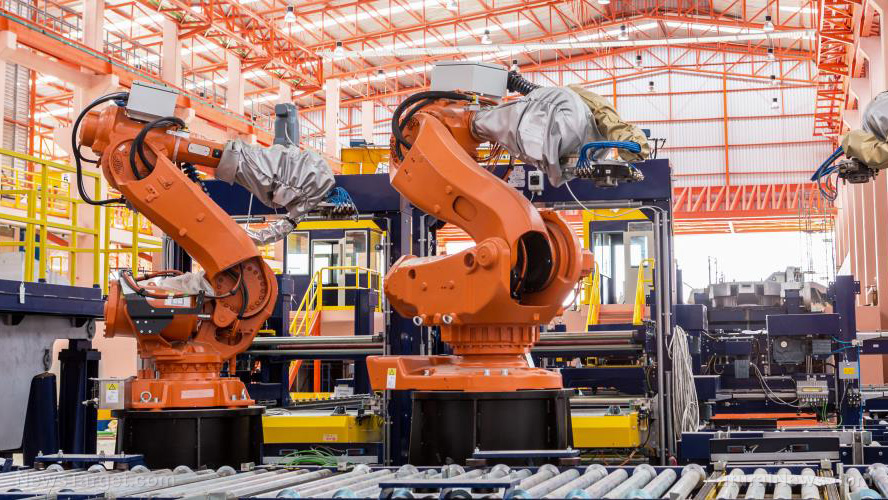Germany’s economic backbone at breaking point as millions of family-owned companies face bankruptcy
03/18/2024 / By Belle Carter

A recent Bloomberg report indicated that German family-led companies, which are traditionally seen as the backbone of the country’s economy, are currently on the verge of bankruptcy. German authorities have revoked some subsidies for national businesses, which could potentially lead to the collapse of a significant number of companies.
Roughly three million family-run businesses have been reported to have seen critical investments in new technologies as unfeasible or not worth the trouble, due to stiff economic headwinds, elevated borrowing costs and a proliferation of red tape.
“The number of small and mid-sized German companies coming up for sale has been piling up for years,” said Jens Krane, head of mergers and acquisitions at Commerzbank AG, which specializes in the type of businesses. “A combination of new regulations and the need to invest heavily in transforming or scaling businesses has created a sense of ‘I’ve had enough’ among many entrepreneurs,” according to the analyst, who emphasized that the situation had already been complicated by the coronavirus pandemic and the energy crisis. These challenging conditions have reportedly prompted some owners to consider the sale of their company, while heirs have become less likely to be eager to take over the family business.
Family-run businesses, or Mittelstand, have built a reputation globally for many highly specialized companies that are spread across the country and often dubbed as hidden champions. Traditionally owners preferred to pass on their companies within the family and only considered a sale if they had to. “The mindset of heirs has changed, and fewer and fewer company heirs are willing to take over responsibility as chief executive officer for their parents,” Jan-Philipp Pfander, a partner at Proventis Partners, a corporate finance boutique advising on sell sides for family-led companies in Germany, Austria and Switzerland, said, as quoted by the news outlet.
Burc Hesse, a corporate partner at law firm Latham Watkins, said companies are now more open to offers from investors such as private equity funds. “What we keep hearing from German founders and owners is that the complexities of running a business are greater than ever before,” Hesse said. “Price is becoming less relevant when selling your company.”
The situation became even more challenging after Germany’s constitutional court ordered the ruling coalition to stop excessive off-budget funding in 2023. Berlin had to curb spending, which also limited some funds for businesses that were already struggling with higher energy costs. “The German Mittelstand is bubbling over,” said Peter May, founder of May Consulting, which specializes in family-held companies. “I receive calls from unsettled family entrepreneurs almost every week: Should we sell? Do we perhaps even have to? Is it still worth being an entrepreneur in Germany?”
Businessmen finding ways, even outside the nation, to stay afloat
One businessman affected by the current predicament in Germany is Steffen Cyris, the owner and chief executive of Bavarian manufacturer of refrigerated deli counters and dry-age beef rooms Schrutka-Peukert. Back in December, he was confident of the company’s pathway, boasting at the Christmas party about their packed order books, brushing off Germany’s broader economic woes and telling employees to prepare for some extra work this year.
However, in a matter of weeks, that optimism was gone as butchers and bakeries canceled their orders. The reason? The subsidies that Germany stopped at the beginning of January. Now, with the country sliding deeper into recession, Cyris is increasingly concerned about the long-term prospects of his business. “The situation is so tense that I’m not sure I’d decline an offer from an investor should I get one,” he said.
Now, to mitigate some of the business he’s losing in Germany, Cyris has begun moving part of his business to the U.S. under the brand Aging Room. He’s now selling dry-age beef rooms to fine-dining restaurants and butchers in states including California and Florida and is exploring options for getting an investor on board. “Invented in Germany, made in the U.S., might be our way forward,” is his new battlecry.
Meanwhile, around 125,000 small and mid-sized companies in Germany will be transferred to new owners every year until 2027 and nearly three-quarters of them see succession as a problem, German development bank KfW wrote in a recent note. Even if there is a successor, the prospect of a sale is rarely off the table. Norbert Stein, founder of Vitronic camera maker, hired an outside chief executive in 2020, only then to sell the firm to a rival company owned by billionaire Czech investor Renata Kellnerova. (Related: German economy collapsing after nation abandoned nuclear energy – prices soar, industries implode.)
Sources for this article include:
Submit a correction >>
Tagged Under:
backbone, bankruptcy, big government, Bloomberg, Bubble, Collapse, critical investments, economic riot, economics, elevated borrowing costs, energy supply, family-led companies, finance riot, Germany, inflation, money supply, red tape, risk
This article may contain statements that reflect the opinion of the author
RECENT NEWS & ARTICLES
COPYRIGHT © 2018 MONEYSUPPLY.NEWS
All content posted on this site is protected under Free Speech. MoneySupply.news is not responsible for content written by contributing authors. The information on this site is provided for educational and entertainment purposes only. It is not intended as a substitute for professional advice of any kind. MoneySupply.news assumes no responsibility for the use or misuse of this material. All trademarks, registered trademarks and service marks mentioned on this site are the property of their respective owners.





















